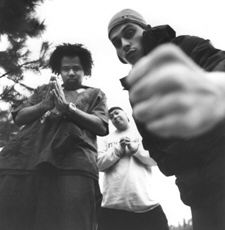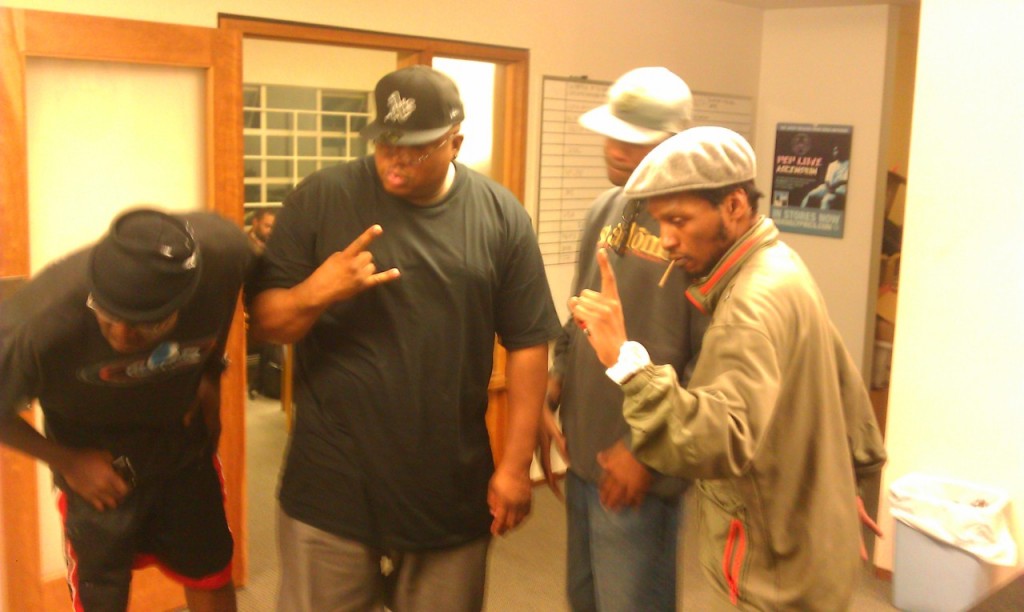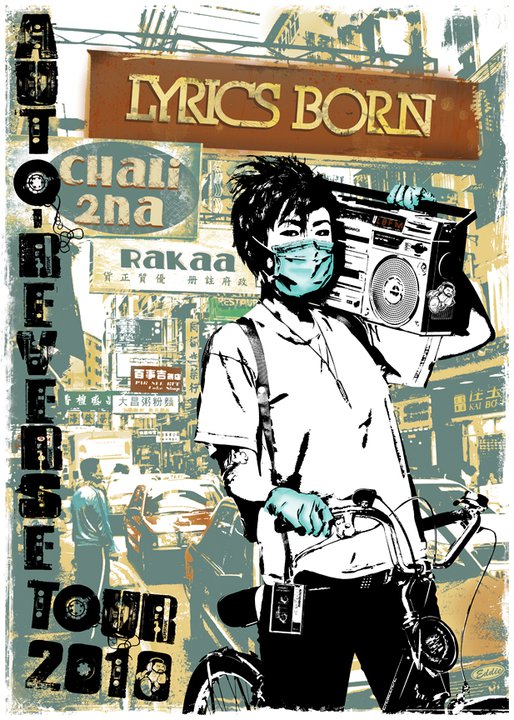 photo courtesy Block
photo courtesy Block
Rakaa-Iriscience
So, I’ve got to apologize for taking so long with this. First off, these interviews were HELLA long, and it took me forever to transcribe them. Although I’d been talking to Rakaa (it gets weird to call him Iriscience) for some time, it’s been hard to find time to do a formal interview. I’m doing this as part of an article I’m writing for a magazine (it’s the cover story on the fall issue of Remix-more on this later). He’s crazy busy: on the road, filming videos, studying jujistu…I finally call and wake him up one morning.
P: So, let’s just start with the whole history thing.
R: I met Evidence at a graffiti yard. I was finishing a piece, he was coming to start one. We ended up meeting each other. We had some mutual friends and whatnot. A little while later, he came into a place I was working. Where I worked was a spot called the Hip Hop Shop in L.A. They had open mics, open turntables, and everything else. You could just go in there and do your thing. I was in there every day freestyling, basically. He came in a few times and would be freestylin’. We decided to hook up and work on a track together. That turned into a couple of tracks and then the group. We got together and created a group and did our thing like that for a minute. A few years later in early 97, Babu joined the group. I had known him for awhile just being in the DJ scene…I hang out in the DJ scene. His reputation was definitely circulating wide. But he was also a really cool person. We ended up meeting and chillin’ and getting along really well. When he moved a little closer-into Hollywood to manage Fat Beats-we ended up networking and Ev slid him the record, and everything else moved from there. We linked up. He joined right before, “Work the Angles”, and we’ve been together ever since.
P: When did you first meet Ev?
R: That was ’92.
P: So when did you guys actually become a group?
R: Later in ’92.
P K: How did you come up with your name?
R: Well, initially we were looking for a name, and I had a publishing company I was going to start. It was called “Expanding Pupils” which meant “growing students”, and to me that’s what it was. We were looking for a group name at the same time, and actually the Alchemist (the producer), said “Dilated Peoples is ill. What about Dilated Peoples?” It just kind of stuck from there. It was as simple as that. What it means is people of expansion, people dilated in a sense that we’re open. Philosophically, we just stay open to change and understanding of that. Also, as a goal to do the same to others-to get other people open-whether it’s on our stuff or whether it’s to get people open in general. It’s good to be open and widen the margins a little bit.
P: I was just at the National Teen Poetry Slam in SF. It was amazing how many teens and kids knew who you were and were like, “When’s their shit coming out?”. You have totally expanded to people that I thought would not even be into hip hop, let alone know what’s up…they’re waiting for your album.
R: We’ve done our homework a little bit, and we’ve gone around and put ourselves on the line to be out there and network and be in front of the people and plant seeds. We’ve been able to meet some really beautiful people around the planet. Definitely at home, that’s where we’re at, so we make sure we try to keep everybody touched around here. The fact that the people come out and have a good time and are looking forward to our stuff is one of the most beautiful feelings. I cannot even express how it feels to be in this position. We were going to do it regardless, but to have it pay off and at the same time have it be accepted is just a really beautiful experience.
P: When you had first gotten together, you had a deal with Immortal. What happened?? You had put something out, but it wasn’t really the total representation of what you guys were doing.
R: We never put out the album. We put out one song on a compilation. We did an album, but we decided that that was school and that was our school project. We decided it was time to go pro to take it to pro games, pro league level. We stepped out of that thing. It was a situation where we didn’t feel like for the amount of energy we were expending we were getting proper mileage. We bounced. That was kind of that. That meant taking a risk-we could have stayed on the label and hoped that everything worked out, but we left and decided to take our fate into our own hands. We figured our career was bigger than one record label, one record, so here we are now.
P: How did you guys meet Beni B?
R: Beni B? We met Beni B when Ev was producing Defari. Defari was always talking about Beni B, this cat from the Bay that was a DJ and a record collector and he was going to put out his first record and stuff…that’s exactly what happened. We liked how Beni did with Defari’s records, and he approached us. Ev had me talk to Beni, I liked what he was talking about, so we just got down and did it.
P: How is it working with people who have been your friends for a long time, like Alchemist or Joey Chavez or something?
R: It’s cool. Those are two of Ev’s best friends since they were younger. It’s not really as serious for me. Those are the homies, but…at the same time, they come in a very natural way. I listen to a tape…if Joey did it and that’s the track I want, it’s gonna go down. Otherwise, it’s just Joey Chavez, my homeboy from Venice. Same with Al (Alchemist). We see each other, we chill. I go out to New York or he comes out to LA. It’s all family. We go get ourselves a little Japanese food, a little shrubbery, and everything is good. If he comes with that hot beat, I want it. If it’s not the right beat for me…I just wish him well in his career…hopefully it will be a hit for somebody else. That’s usually how I look at things. It’s never really been a problem. On the other hand, Ev and I have known each other for eight years, so we’ve known each other longer than a lot of people have been married and businesses have been open-all kinds of things can happen in that time. When you deal with someone that you know that well, things can get personal really quick because you know which buttons to press, but at the same time, you also really realize that you’ve been together this long and gone through this much for a reason. If you have kind of self control to get things back. That’s how we’ve been able to do it: give each other our space; support each other in our solo things-we’re not trying to crowd each other. And then come together and really form and do this Dilated thing the right way.
P: How is it when Dilated is in the studio…it’s very collaborative?
R: It’s very collaborative. In a very general sense, Dilated Peoples produced this entire album. At the same time, we didn’t make the music for every track. We were very involved in picking every track, with opinions in the studio how things should go, arrangements…across the board. With full respect to everybody that worked on it, I’m not trying to take anything away from the listed producers, but we oversaw the entire album as an album. That’s basically how we always want to approach everything in a collaborative way, even if it’s a solo song for me or a solo song for Ev or whatever the case is. We still figure out how it best fits on the album or the live show.
P: It’s totally your vision.
R: It’s a vision that comes out of the democratic process of three people. It’s our agreed upon vision. We speak as one. We have one vision and one voice when we’re working together. We work all our problems out behind the scenes. Once we figure out how we’re gonna do it and how we can all feel comfortable with the idea, then we present it. We stay focused like a laser beam.
P: How did you decide who you were gonna have guest on the LP? I’m sure there were zillions of names thrown around. Did you make a conscious effort to have people that were mainly from LA/West Coast? Did it just happen that way? Did you have a a lot of discussion about who or who would not be included on the album? It feels like there are a lot of people trying to get down with you guys.
R: Do you know that feeling like when you reach into your pocket and pull out some money it’s and it’s like “Oh! yeah!” It was a really pleasant surprise, but the furthest thing from our minds when putting it together. I remember looking at the list of everybody and thinking everybody’s from or represents the LA/West Coast hip hop scene.
P: Or transplanted
R: Based out of or from, either way. It didn’t really occur to us when we were putting it together. We were planning on working with all types of people. We did a song with AG (Showbiz and AG) and we’ve worked with other people in the past, even overseas and things like that, but when it came down to pick songs for the album and what worked best for what we were doing, with the people and the time schedules and everything, this is how it was and this is how it felt-like it was ready to be served, so that’s how we did it.
P: Were there a lot of other tracks that didn’t end up on the album?
R: A couple, we stay busy. A lot of it is exercise, training. And expression. A lot of it is venting. We’re really creative, expressive people, we’ve gotta get it out some kind of way. But we’re very concise when it comes time to pick what we want to put out.
P: Do you ever worry about being overexposed? How do you choose who you’re going to work with under those circumstances-when it’s someone else’s project? When someone asks you to be on a track…or is it more organic-that you’re just chillin’ with people and roll into the studio with them?
R: We have a strong discography if you look at a list. A lot of people have a lot less numbers by their name, but at the same time, those are albums. We haven’t put out any albums, we’ve done a lot of work, but it’s been really planting seeds. We haven’t fully formed yet, we’re still forming. I do recognize that I can’t spread myself too thin, and we know that we have business situations that are involved, so we can’t just do everything although we love to collaborate and work with people. Ultimately, we know when to chill, or recharge. We don’t get beyond ourselves. I don’t really worry about it too much.
P: How did you decide on Capitol?
R: It was a really unique situation. Pretty much every record label at the time was trying to talk to us. A lot of labels have had success with hip hop, Capitol isn’t really one of them, short of the Beastie Boys, and that isn’t really the same branch of the tree that we’re on. The Beastie Boys are definitely hip hop and very influential, but they were already huge and diverse in their sound when they got over there. To break a group like us…I think the situation at Capitol is a combination of a lot of things. One was that we had a nice amount of light and momentum going into the situation. And two, was that they didn’t have success in a big way with hip hop so they didn’t have a system in place that would confine us to doing things a particular way. They had a desire and a resource and a willingness to be open to ideas, and that’s what made us head over there. It’s that they were open, and they wanted us to help them develop a system, not only for ourselves, but also for the future.
P: Where do you see hip hop going in the next few years as far as like, a lot of the huge somewhat underground groups, particularly from LA, have gone and signed to majors, where do you think the next wave of inventiveness is going to come from?
R: I think it’s going to be a wave from overseas, to be honest. There’s so much quality stuff going on…I travel a lot. There’s so many ideas that haven’t been touched on, so many ways of looking at things. All it takes is for somebody to make that bridge record for it to spark. There’s stuff over there that’s happening that could really do it. I think Canada, that’s gonna happen. All of what we consider Latin America. I think just culture in general is going to be accepted more in hip hop. People aren’t going to be as reluctant to accept new ideas and new approaches in the future because they’re not going to be able to fight with success. [We have a discussion about some amazing emcees from Bosnia and talk about how it doesn’t always matter if you can understand the language they’re speaking…the true emotion comes through.]
P: Where do you get your inspiration for writing?
R: I get it from everywhere, walking around. I get it from John Coltrane’s horn lines, Jimi Hendrix, listening to his songwriting (even aside from his guitar playing) has been extremely influential. Public speakers, my teachers, church…I’ve been inspired by all sorts of things. Gil Scott Heron, Last Poets, Watts Prophets. Boogie Down Productions, Public Enemy, Kool G Rap, Rakim, Run DMC. I’ve been inspired by hip hop in general. I guess the best way to say it is just by my environment in general. I try to tune out so I can tune in and really just absorb what’s around me. When you travel and you go to this country and that country, and you’re seeing different color money, and different types of people and different attitudes, and you come back to LA, for a little while you get this feeling like LA is just another country, just a city in another country. When you’re looking at things that way, you get a chance to feel the culture that’s here. I’m really influenced by the LA culture, which is just a combination of just different things from all over the world, like most places.
P: Have you lived there all your life?
R: No, I’ve lived all over, but pretty much I was born in LA and I’ve always come back, regardless of where I’ve skipped out to. I’ve got a lot of love for LA, and that’s with full respect for every inch of the world, but I love the people of LA. There’s bureaucracy here and it’s a pretty conservative place. I don’t like everything that happens in LA, but I think it’s beautiful.




